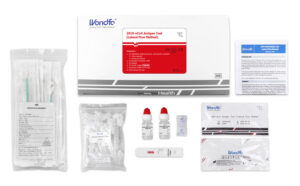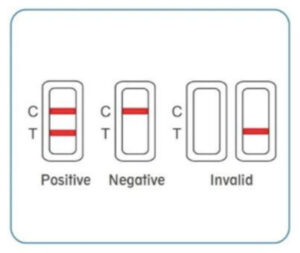The rapid antigen test has become the most used tool – both publicly and privately – to quickly find out if you have come into contact with the Sars-CoV-2 virus, thus allowing better tracking of infections.
SARS-COV-2 Rapid Antigen Test
Test that can find out if you have come into contact with the Sars-CoV-2 virus.
Rapid antigen test: what is it?
This is a diagnostic test which, by means of a nasal, nasal/oral-pharyngeal or salivary swab, allows to quickly highlight the presence of the Sars-CoV-2 virus in the clinical sample at that precise moment.
Unlike the molecular swab, the rapid antigen test detects the direct presence of the virus not through its genome but through its proteins, i.e. antigens, visible to the naked eye.
It’s carried out by specialized personnel in analysis laboratory, doctor’s office or pharmacy (recently introduced).
The result is almost immediate. As indicated by the National Institute of Health, 30-60 minutes – now even 10-15 minutes – are sufficient to detect the presence or absence of antigens in the sample indicative of an ongoing viral infection.
Considering the validity of the tests and the possible purposes, the rapid antigenic nasopharyngeal swab can be used in cases of subjects with a high probability of infection: the rapid test allows a fast response to the suspected positivity with immediate isolation which will then be followed by a molecular test confirmation of infection. This offers the advantage of rapidly isolating infected patients to minimize the risk of transmission, the need for a laboratory and specialized personnel.
The execution speed and cost effectiveness are the strong point of the rapid swabs. The reliability of the rapid antigen test is around 97,67%.

Contents of the package of 20 Tests
- Reactive card contained in a sealed blister;
- Test tube containing the extraction liquid;
- Nasal swab;
- Extraction tube;
- Instructions for Use.
Interpretation of the result
The positive result indicates that viral antigens were found in the sample taken. In this case it’s necessary to confirm the positivity with a molecular test.
While waiting for the outcome, the patient must consider himself infected and contagious, place himself in isolation and inform his family doctor. The laboratory will notify the ASL Prevention Department for the purpose of taking charge and tracing the contacts.
The negative result confirms that no viral antigens were detected in the swab analyzed. The person is likely not infected or contagious.


